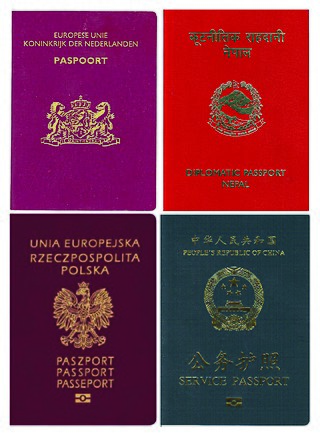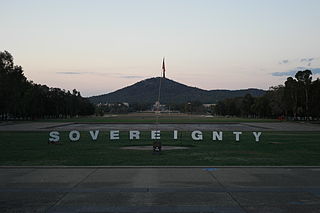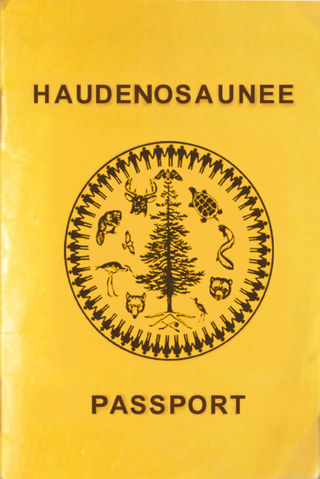Related Research Articles

Mabo v Queensland is a landmark decision of the High Court of Australia that recognised the existence of Native Title in Australia. It was brought by Eddie Mabo and others against the State of Queensland, and decided on 3 June 1992. The case is notable for being the first in Australia to recognise pre-colonial land interests of Indigenous Australians within the common law of Australia.

A passport is an official travel document issued by a government that certifies a person's identity and nationality for international travel. A passport allows its bearer to enter and temporarily reside in a foreign country, access local aid and protection, and obtain consular assistance from their government. In addition to facilitating travel, passports are a key mechanism for border security and regulating migration; they may also serve as official identification for various domestic purposes.

Australian Indigenous sovereignty, also recently termed Blak sovereignty, encompasses the various rights claimed by Aboriginal and Torres Strait Islander peoples within Australia. Such rights are said to derive from Indigenous peoples' occupation and ownership of Australia prior to colonisation and through their continuing spiritual connection to land. Indigenous sovereignty is not recognised in the Australian Constitution or under Australian law.

The Aboriginal Tent Embassy is a permanent protest occupation site as a focus for representing the political rights of Aboriginal Australians and Torres Strait Islander people. Established on 26 January 1972, and celebrating its 50th anniversary in 2022, it is the longest continuous protest for Indigenous land rights in the world.
Native title is the set of rights, recognised by Australian law, held by Aboriginal and Torres Strait Islander groups or individuals to land that derive from their maintenance of their traditional laws and customs. These Aboriginal title rights were first recognised as a part of Australian common law with the decision of Mabo v Queensland in 1992. The doctrine was subsequently implemented and modified via statute with the Native Title Act 1993.

The visa policy of Australia deals with the requirements that a foreign national wishing to enter Australia must meet to obtain a visa, which is a permit to travel, to enter and remain in the country. A visa may also entitle the visa holder to other privileges, such as a right to work, study, etc. and may be subject to conditions.

Camp Sovereignty is the name given to an Aboriginal and Torres Strait Islander protest movement established as part of the "Black GST" political movement. GST stands for ending genocide, acknowledging sovereignty and securing treaty. The camp has existed as two iterations, one in March 2006 and one in January 2024.

A travel document is an identity document issued by a government or international entity pursuant to international agreements to enable individuals to clear border control measures. Travel documents usually assure other governments that the bearer may return to the issuing country, and are often issued in booklet form to allow other governments to place visas as well as entry and exit stamps into them.
Indigenous Australian self-determination, also known as Aboriginal Australian self-determination, is the power relating to self-governance by Aboriginal and Torres Strait Islander peoples in Australia. It is the right of Aboriginal and Torres Strait Islander peoples to determine their own political status and pursue their own economic, social and cultural interests. Self-determination asserts that Aboriginal and Torres Strait Islander peoples should direct and implement Aboriginal and Torres Strait Islander policy formulation and provision of services. Self-determination encompasses both Aboriginal land rights and self-governance, and may also be supported by a treaty between a government and an Indigenous group in Australia.

Aboriginal title is a common law doctrine that the land rights of indigenous peoples to customary tenure persist after the assumption of sovereignty to that land by another colonising state. The requirements of proof for the recognition of aboriginal title, the content of aboriginal title, the methods of extinguishing aboriginal title, and the availability of compensation in the case of extinguishment vary significantly by jurisdiction. Nearly all jurisdictions are in agreement that aboriginal title is inalienable, and that it may be held either individually or collectively.

Kevin Buzzacott, often referred to as Uncle Kev, was an Aboriginal Australian rights campaigner and elder of the Arabunna nation in northern South Australia. He campaigned widely for cultural recognition, justice, and land rights for Aboriginal people. He initiated and led numerous campaigns, including against uranium mining at Olympic Dam mine on Kokatha land and the exploitation of the water from the Great Artesian Basin. He also published a collections of poetry, which included the content of his keynote address at a 1998 conference.

Michael Alexander Mansell is a Tasmanian Aboriginal (Palawa) activist and lawyer who has campaigned for social, political and legal changes.
In Australia, Canada, New Zealand and the United States the term treaty rights specifically refers to rights for indigenous peoples enumerated in treaties with settler societies that arose from European colonization.

The Iroquois or Haudenosaunee passport is a passport issued by the Iroquois Confederacy.
Clarence Frederick "Clarrie" Isaacs, also known as Yaluritja and Ishak Mohamad Haj, was an Aboriginal Australian activist.

The Aboriginal Provisional Government (APG) is an Indigenous Australian independence movement in Australia.
The National Aboriginal Conference (NAC) was a national organisation established by the Australian Government to represent Indigenous Australians, that is Aboriginal Australians and Torres Strait Islander peoples.
Indigenous or Aboriginal self-government refers to proposals to give governments representing the Indigenous peoples in Canada greater powers of government. These proposals range from giving Aboriginal governments powers similar to that of local governments in Canada to demands that Indigenous governments be recognized as sovereign, and capable of "nation-to-nation" negotiations as legal equals to the Crown, as well as many other variations.
Indigenous treaties in Australia are proposed binding legal agreements between Australian governments and Australian First Nations. A treaty could recognise First Nations as distinct political communities, acknowledge Indigenous Sovereignty, set out mutually recognised rights and responsibilities or provide for some degree of self-government. As of 2024, no such treaties are in force, however the Commonwealth and all states except Western Australia have expressed support previously for a treaty process. However, the defeat of the Voice referendum in 2023 has led to a reversal by several state branches of the Liberal and National parties in their support for treaty and a much more ambiguous expressed position by state branches of the Labor Party as well as Labor governments.
Controls imposed on internal borders within a single state or territory include measures taken by governments to monitor and regulate the movement of people, animals, and goods across land, air, and maritime borders through border controls.
References
- 1 2 Joshua Robertson, Tolerance of travellers with Aboriginal passports amounts to recognition, says activist, The Guardian (April 20, 2015).
- ↑ "Fantasy passports". Information concerning the non-exhaustive list of known fantasy and camouflage passports, as stipulated by Article 6 of Decision No 1105/2011/EU (PDF). European Commission. 15 February 2023. p. 2.
- 1 2 "Desperate Times". Message Stick. 14 May 2004. ABC Television. yes.
- ↑ Frail, Rod (30 June 1988). "Mansell group held up in passport hitch". The Age. Retrieved 28 May 2010.
- 1 2 3 Page 91 - Hocking, Barbara (2005). Unfinished constitutional business?: rethinking indigenous self-determination (2005 ed.). Aboriginal Studies Press. ISBN 978-0-85575-466-2.- Total pages: 293
- ↑ Linnekin, Jocelyn; Poyer, Lin (1990). Cultural identity and ethnicity in the Pacific. University of Hawaii Press. p. 217. ISBN 0-8248-1891-1.
- ↑ Fletcher, Christine (1994). Aboriginal self-determination in Australia. Aboriginal Studies Press. p. 165. ISBN 0-85575-252-1.
- ↑ Assange gets an Aboriginal passport, Australian Associated Press (September 15, 2012).
- ↑ Indigenous campaigners re-enter Australia on Aboriginal passports, Special Broadcasting Service (September 19, 2014).